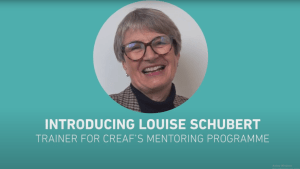Desenvolupament de carrera
Desenvolupament de carrera
Al CREAF, volem fomentar el creixement professional dels nostres investigadors i investigadores, promovent una cultura de recerca acollidora, participativa i equitativa. Tant si estàs iniciant la teva trajectòria acadèmica com si estàs traçant un nou camí professional, estem aquí per ajudar-te. Explora els nostres serveis i comença avui mateix el teu camí de desenvolupament professional!

Programes de desenvolupament de carrera
Programes de desenvolupament de carrera
El CREAF ofereix un retir de desenvolupament professional per a predocs, amb l’objectiu de reflexionar sobre la trajectòria professional, explorar diferents oportunitats i enfortir la comunitat de recerca en un entorn únic.
Durant el retir, les persones participants dediquen temps a reflexionar sobre les seves habilitats i interessos, explorar les opcions professionals després del doctorat, adquirir eines per elaborar un CV efectiu i sentir-se preparades i segures per afrontar una entrevista, al mateix temps que estableixen vincles amb altres predocs. El programa combina tallers pràctics, espais de reflexió i moments de pausa per aprofundir en el propi desenvolupament professional, amb suport i acompanyament personalitzat.
El retir és facilitat per Teresa Rosas, responsable de Talent Acadèmic i EDI del CREAF.


El programa de mentoria del CREAF emparella personal investigador postdoctoral amb personal investigador més experimentats. Durant un any, les parelles mentors i mentorats es reuneixen regularment per discutir, en un entorn segur i confidencial, qüestions relacionades amb la seva vida professional, compartint habilitats, coneixements i experiències. . Més informació sobre el programa aquí.
- Mentorat/ada: Parlar amb algú m'ha ajudat a verbalitzar alguns debats interns sobre quina direcció prendre en la meva carrera.
- Mentorat/ada: No ens coneixíem gaire abans i no treballem junts, i aquesta independència/distància professional és realment ideal (al meu parer) per parlar clarament sobre avantatges i desavantatges, punts forts i febles.
- Mentor/a: A través del programa de mentoria, vaig adonar-me que moltes de les meves preocupacions professionals són sorprenentment similars a les del meu mentorat, tot i que estem en etapes molt diferents de la nostra carrera. Aquesta visió ha estat molt valuosa.
- Mentor/a: Ser mentora en aquest programa m'ha ensenyat la importància d'escoltar profundament en lloc de simplement pensar en quina podria ser la resposta. Aquest enfocament ha impactat les meves interaccions i ha estat molt gratificant.
Els nostres tallers en grup t’ofereixen suport al llarg de tota la carrera investigadora. Durant les sessions explorarem opcions de carrera dins i fora de l'acadèmia, com preparar un bon currículum i tècniques per preparar-se per fer una bona entrevista i així augmentar les teves possibilitats d'aconseguir la feina que desitges.
La Setmana de la Carrera consisteix en sessions informals i dinàmiques que faciliten connexions entre el personal del CREAF i professionals que han seguit camins de carrera diversos després del doctorat, tant dins com fora de l'acadèmia. Serveix com una plataforma per ampliar horitzons, inspirar-te i explorar un espectre ampli d'opcions professionals més enllà de les tradicionals.
T’oferim orientació personalitzada adaptada a cada persona. Tant si estàs explorant opcions de carrera, buscant consells sobre quines sol·licituds de beques demanar, o plantejant-te el teu pròxim pas professional, estem aquí per donar-te suport en cada pas del camí.
Aquesta convocatòria ofereix quatre beques inicials per crear una cartera de projectes liderats per investigadors en inici de carrera al CREAF. El seu objectiu és abordar un coll d'ampolla clau en les carreres acadèmiques: la dificultat dels joves investigadors per convertir-se en investigadors principals (PI).
A través d'aquest programa, pretenem que els investigadors postdoctorals puguin desenvolupar i liderar projectes de recerca originals, enfortir les seves habilitats de lideratge i millorar la seva visibilitat i competitivitat en futures convocatòries de finançament. Cada beca proporciona suport financer i institucional durant un màxim de dos anys.
Testimonis del programa de Mentoring
Persona de contacte






